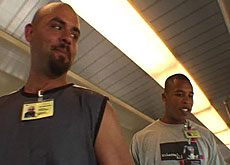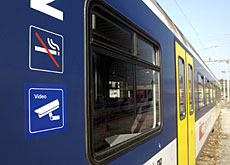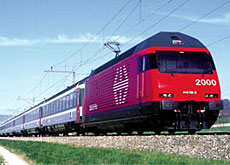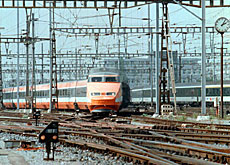Guardian angels to protect Swiss trains

The Swiss Federal Railways is beefing up its defences after an increase in vandalism on trains, and a big rise in violence against rail personnel.
Last year there were 686 attacks on staff, 25 per cent more than in the previous year.
During the same period, more than 3,000 acts of vandalism were recorded, an increase of three per cent, costing Switzerland’s main rail operator SFr8 million ($6.5 million) in repairs and cleaning bills.
In western Switzerland, train bosses have adopted a novel approach in their war on crime. Since December last year, teams of “Big Brothers” have been patrolling trains running between Sion, Monthey and Lausanne. The experiment is soon to be extended to Geneva.
Big Brothers
In the early 1980s, the Guardian Angels raised eyebrows as the self-appointed defenders of New York, patrolling the city’s subways in an effort to make them safer.
Frenchman Medhi Messadi successfully ran a similar scheme on trains in the suburbs of Paris. Now he has brought his know-how to Switzerland, and taken two teams of “Big Brothers” under his wing.
Unlike their American counterparts, Switzerland’s guardian angels do not wear berets, just official badges, and they are not volunteers: they are paid by the Federal Railways.
“Big Brothers” Sylvain and his colleague Alexander are a formidable pair. They are both tall, muscular, and have experience working as nightclub bouncers. This helps when it comes to throwing graffiti artists and drug dealers off trains.
But it is brains rather than brawn that come in most useful, when it comes to negotiating with difficult customers. Messadi maintains that most acts of violence and vandalism have their roots in social problems, and what offenders need most is a sympathetic ear.
Passengers swissinfo spoke to on the Montreux-Yverdon line welcomed the “Big Brother” scheme. “I have two small children and I dare not leave the older one in charge while I go to the toilet,” a young mother said. “I feel safer if the ‘Big Brothers’ are around.”
A male passenger added: “They understand people’s problems, and know how to react if someone is behaving in a certain way. It makes me feel much more secure.”
Preventive Presence
For the time being, there are just four “Big Brothers” covering the French-speaking region. Considering the scale of its problem, the Federal Railways clearly had to adopt additional measures to tackle violence and vandalism.
In January 2004, the company got permission to fit close circuit television cameras across its train network. Now video surveillance systems are being installed on 220 regional trains in western Switzerland, with five to eight cameras in each carriage.
Phones with a direct link to the traffic police control centre are also being fitted next to emergency brakes on trains, and a major renovation programme is in progress to make regional stations safer and more graffiti proof.
One hundred stations have already been given a face-lift under the SFr340-million scheme.
Meanwhile, the railway police squad, Securitrans, is being expanded, with 100 new officers being deployed by the end of 2005, bringing the total to 250.
Patrols on trains and in railway stations will be doubled. Staff members receive the same training as regular police officers, and often wear plain clothes while they are on duty.
Not all that bad
Despite the bleak statistics, the Federal Railways maintains that its rail service is still one of the safest in the world, and that the likelihood of being a victim of violence on trains is four to five times higher in Germany and France.
Even so, Big Brother Sylvain insists that people are increasingly afraid to travel at night, and many train crimes – particularly of a sexual nature – go unreported. “You have to have an official presence on the trains – you can’t just have nothing,” Sylvain said.
The Federal Railways will decide at the end of the year whether to continue with the “Big Brother” project. Its trains carry about a million passengers a day and the company cannot afford to have them scared off.
swissinfo, Julie Hunt
In 2003, the transport police, Securitrans, threw 11,000 passengers off trains and arrested 1,400.
Last year, there were 686 attacks on Federal Railways staff, 25% more than in the previous year.
Acts of vandalism increased by 3%.
Criminal damage on trains costs the railways about SFr10 million per year.
The Federal Railways is trying to crack down on violence and criminal damage on trains, after new figures showing an increase in attacks on its staff and property.
In western Switzerland, teams of mediators – Big Brothers – have been hired to persuade hot-tempered passengers to cool it.

In compliance with the JTI standards
More: SWI swissinfo.ch certified by the Journalism Trust Initiative




You can find an overview of ongoing debates with our journalists here . Please join us!
If you want to start a conversation about a topic raised in this article or want to report factual errors, email us at english@swissinfo.ch.